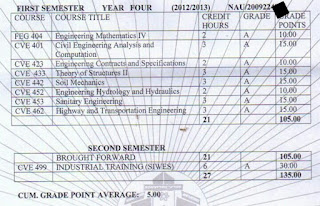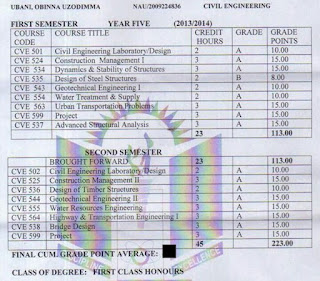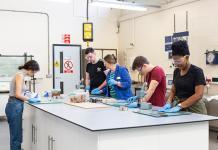The role of a civil engineer in the advancement of civilisation and the cause of mankind cannot be overemphasized. If for any reason you find yourself studying civil engineering in an institution of higher learning, you should feel lucky provided you are convinced that you are where you are supposed to be.
Civil engineers work very closely with people, and are involved in the development and maintenance of public infrastructures and utilities. There are varieties of clients like private individuals, government, corporate bodies, organisations, etc. for civil engineering projects. Therefore, the sole responsibility of a civil engineer is to conceptualise, design, and build infrastructures and utilities that will meet and satisfy the intended use of the structure in an economical manner.

This activity must have safety as top priority, and must offer minimal disruption to public/individual daily activities. That is why sometimes civil engineers will have to schedule their work at night or work during the weekends in order to keep other people happy and comfortable. So as you can see, the career path you are about take has ‘people’ as top priority, and you should be proud to be engaged in such a noble profession.
Civil engineering is a very broad field of knowledge. That is the main reason why many important aspects of the course cannot be covered at undergraduate level. If all relevant topics were to be fully treated, civil engineering students should be spending a minimum of seven years at undergraduate level.
There are specialties in the field of civil engineering, and students normally choose an area of specialisation during their Masters Degree program. The prominent specialties are;
- Structural Engineering
- Geotechnical engineering
- Water Resources Engineering
- Highway and Transportation Engineering
- Environmental/Sanitary Engineering
- Construction Management
However, whenever you graduate from the university as a civil engineer, there is a minimum level of knowledge expected of you in all these fields of knowledge, and whenever you fail to meet it, it is very disappointing. For example, basic training in the university should give you the capacity to understand, explain, and recommend structural concepts, carry out simple-medium complicity designs, carry out simple field measurements, produce and interpret working drawings, have knowledge of civil engineering materials, and be able to make technical decisions. A lot of knowledge is also gained from the field. As a matter of fact, practice and experience makes a complete civil engineer; and that is why professional license can only be issued after some years of practise.
To succeed as civil engineering student, you must keep the following in mind;
(1) You must be passionate
To excel in this field, you must love it. It is only passion that will make the entire hard work associated with studying civil engineering seem effortless. If you are interested in just obtaining the degree and moving over to the banking industry, it will appear as so much work to you. But if you are determined to practise civil engineering after graduation, then the natural willingness to study and acquire knowledge will make the efforts seem so simple.
(2) Do not be far away from like minded people
To succeed as a civil engineering student, you have to make friends with those in the same department with you, and if possible live close by. There will be numerous assignments, term papers, laboratory reports etc. and sometimes you might need help. It is good these days that social media has bridged a lot of communication gap. So you must belong to the ‘WhatsApp’ group of your class, and make sure you always have internet data in order to be updated with the latest information. If you are close with like minded people, there will always arise discussions that will make you stay on your toes and work hard.
(3) Understand from first principles and follow up
Most civil engineering courses usually build up as you progress. At every stage, you should try and understand what is being taught. For instance, you must understand statics (rigid body mechanics) before you start looking at strength of materials (deformable body mechanics). If you do not understand how to calculate support reactions when you should, then it means you basically cannot progress in structural analysis. In my 5th year, we were permitted to plot bending moment diagrams without showing calculations or steps; and we still get our full marks because at that level, we were dealing with advanced topics. But when we were in the 2nd year, the whole emphasis was on how to carry out such calculations for plotting moment diagram. So never miss any step.
(4) Read widely
Do not rely on classroom notes and exercises only. They can help you pass your exams, but beyond the classroom walls, you will definitely see deficiencies. To be technically excellent, study variety of textbooks with different backgrounds (American, British, Indian, Scandinavian etc). This will give you confidence, power, and speed especially in the exams and after your graduation. It is important to be familiar with more than one method of solving a problem.
(5) Learn computer programs with your free time or during your Industrial Training period
Do not wait until you graduate before you start learning how to use design software and computers effectively. Start from MS office and learn how to do important things like creating tables on MS Word, plotting graphs on Excel, carrying out regression analysis and ANOVA etc. This is very important for your studies and for your career. From there, you can advance to structural analysis and design software, programming softwares like MATLAB, and CAD softwares because a good engineer must be able to produce technical drawings. In this current dispensation, these skills are a must for you to land a job.
(6) Avoid Wild Social Activities
You must be focused and disciplined. Don’t always party all night and come back tired and wasted. However on some weekends, you can hang out with friends, share some drinks, and return to your apartment in good condition. Channel your energy on positive things, and always keep your mind refreshed.
(7) Ask Questions
Always make out time to discuss and ask questions whenever you are confused. Note that whatever you have learnt sticks to your memory, and all you will have to do is to refresh your memory periodically. I remember the first time I was taught analysis of framed structures by a senior colleague. This was after spending hours trying to figure out how to transition from vertical to horizontal members. All he did was to offer an explanation that made sense and solved an example. From that point, other classroom works were just like revision.
(8) Work on your speed in exams
For you to always land your A’s in exam and get your full marks, you have to be fast in your exams. Most structural analysis problems can be lengthy, but lecturers will often limit degree of indeterminacy for hand problems to just 3. This is to avoid you not solving more than 3 x 3 matrix in exam. So you will agree with me that you will still have to be fast because exams are usually 3 hours maximum depending on the weight of the course. One way to achieve this is to practice all examples extensively and plan ahead of every exam.
(9) Understand the requirements of your lecturers
Every lecturer has his/her interest as far academic prowess is concerned (popularly called academic interest). Once you tickle them briefly in your answer sheet by intelligently referring to their work or interest, they will be impressed and see you as a ‘research minded and serious undergraduate student’. Trust me that a lot of scholars are always obsessed with their works and feel so happy when someone refers to it. So you have to sit down and work hard, nothing good comes easy. It will be good to study their question patterns, policies, and the values they uphold in regards to their course. Do not violate this.
(10) Look towards the future
Academic excellence is not ultimate success in life. Find time to balance academic work with worthwhile social activity and volunteering. You can participate in student politics if you wish, and be religiously active. Do not be socially awkward because your social skills and lessons from human interaction will help you more after you leave school. You will later realise that a particular social activity you engaged in will give you more pleasant memories than making an ‘A’ in a 4 units course.
(11) Make your apartment your comfort zone
It will be very stressful for you if you cannot comfortably study in your apartment without distractions. Make sure you have all resources handy. In a country like Nigeria where there is no guaranteed 24 hours power supply, do not rely on soft copy of textbooks or e-books. Make sure you have all your study materials handy in your apartment. Do not make your apartment a movie theatre for your colleagues/neighbours, or a play station game room for your friends. Keep it as private as possible, and possibly make it a place where people can come and add value.
So believe in yourself as you take this giant step towards a career in engineering. It is not difficult but it can be challenging. It is can be stressful, but it won’t break you. Remain determined and persistent till victory roars….
Be inspired for excellence today!!!
Thank you for visiting Structville.













tdtdt
Thanks for a great article! I've read the same kind of news here https://typicalstudent.org/ and also found lots of interesting facts there.
Your content is nothing short of brilliant in many ways. I think this is engaging and eye-opening material. Thank you so much for caring about your content and your readers. oxidizers
Great Article
IEEE Projects for Engineering Students
IEEE Project Ideas for CSE
JavaScript Training in Chennai
JavaScript Training in Chennai
It is really nice explanation!
Wow it’s it productive
Great site you have here. Nowadays it’s hard to find quality text like yours. I really appreciate people like you!!
l love it
This is encouraging to me and to others as well
Thanks.
It’s great you are encouraging individuals who are interested in engineering (mostly in the Architecture field), i see it as a great thing.
Bravo!!!